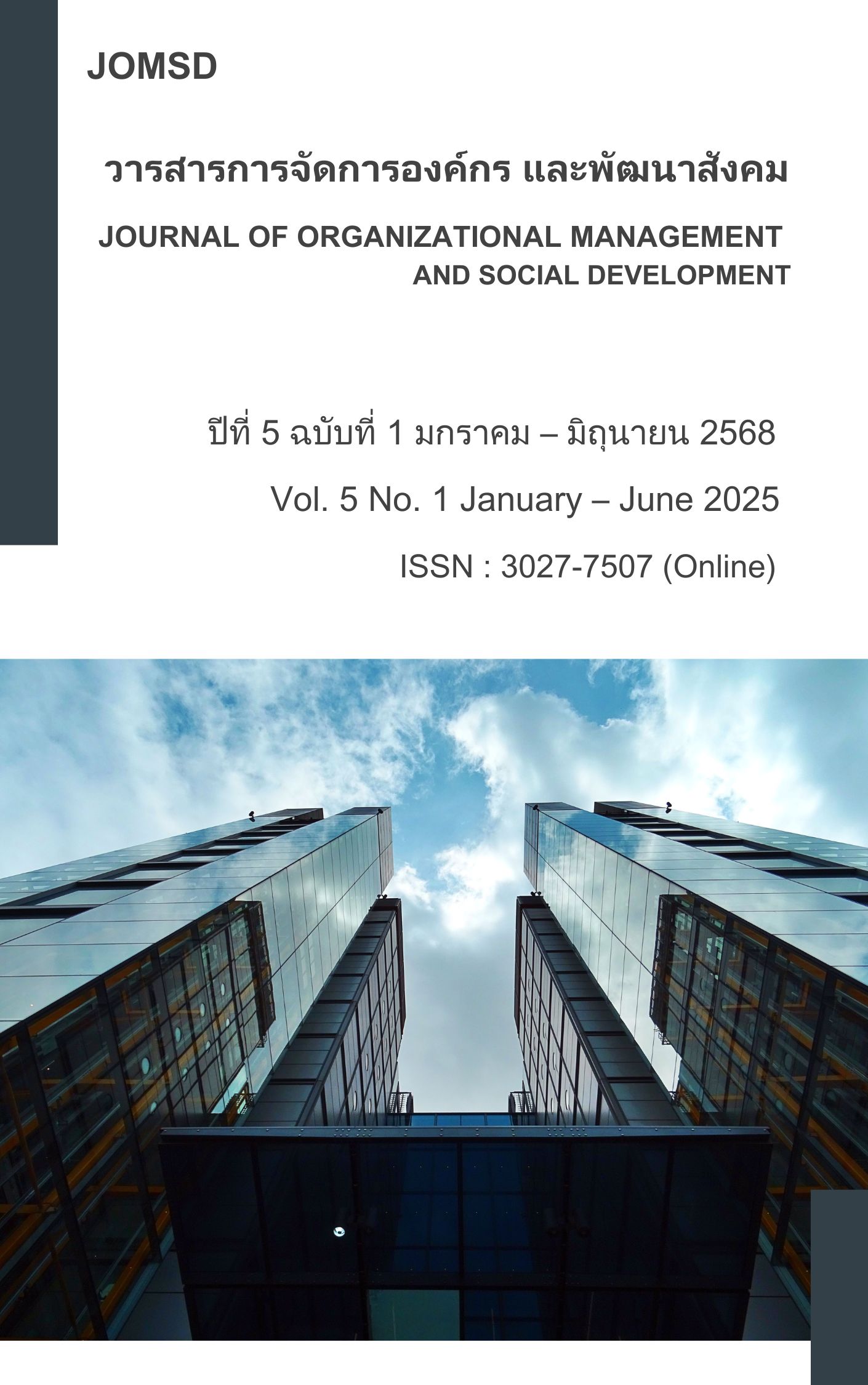Personnel Management According to Sangahavatthu 4 Principles of Primary of District Learning Under Encouragement Center Phatthalung Provincial Office of Learning Encouragement
Main Article Content
Abstract
This study aimed to: 1) examine the current state of human resource management at the Primary of District Learning Under Encouragement Center Phatthalung Provincial Office of Learning Encouragement, and 2) To explore human resource management approaches based on the Sangahavatthu 4 principles at the Primary of District Learning Under Encouragement Center Phatthalung Provincial Office of Learning Encouragement. The study employed a qualitative research methodology, using in-depth interviews with 15 stakeholders and 5 experts. The research instrument was a structured in-depth interview guide. Data were analyzed through content analysis and descriptive synthesis. The findings revealed that: 1) The current human resource management at the District Learning Promotion Centers under the Phatthalung Provincial Learning Promotion Office comprises five key components (1) Personnel planning, which involves workforce planning based on workload analysis and the center’s goals; (2) Recruitment and selection, which is conducted through online systems combined with competency-based assessments based on established criteria; (3) Performance evaluation, which uses key performance indicators (KPIs) aligned with the center’s mission; (4) Compensation, which is administered in accordance with government regulations; and (5) Personnel development, where the centers support capacity building through both online and in-person training programs. 2) The human resource management approach based on Sangahavatthu 4 was found to be successful in fostering cooperation and continuous personnel development. It includes planning aligned with staff development goals and recruiting individuals with moral integrity who fit well with the organization. These practices enhance employees’ sense of responsibility and increase their job satisfaction and organizational commitment.
Article Details
References
กระทรวงศึกษาธิการ. (2545). พระราชบัญญัติการศึกษาแห่งชาติ พ.ศ. 2542 และที่แก้ไขเพิ่มเติม (ฉบับที่ 2) พ.ศ. 2545. สืบค้นจาก http://www.bic.moe.go.th/images/stories/5Porobor._2542pdf.pdf.
ชนิตา เมืองเผือก. (2555). ปัญหาในการบริหารงานบุคคลของสถานศึกษาสังกัดสำนักงานส่งเสริมการศึกษานอกระบบและการศึกษาตามอัธยาศัย. (ศึกษาศาสตรมหาบัณฑิต, มหาวิทยาลัยศรีนครินทรวิโรฒ).
ชัยวัฒน์ คำแหง. (2561). การบริหารงานบุคคลตามหลักธรรมทางพระพุทธศาสนาในสถานศึกษา. (ครุศาสตรมหาบัณฑิต, มหาวิทยาลัยราชภัฏนครราชสีมา).
นพดล จัตุรงค์, ธีระพงษ์ สมเขาใหญ่ และพระครูประโชติกิจจาภรณ์. (2567). การพัฒนาคู่มือการปฏิบัติงานการบริหารงานบุคคลในโรงเรียนขยายโอกาสทางการศึกษา สังกัดสำนักงานเขตพื้นที่การศึกษาประถมศึกษานครศรีธรรมราช เขต 4. วารสารสังคมศาสตร์ปัญญาพัฒน์, 6(4), 293-302.
พระพรหมคุณาภรณ์ (ป.อ. ปยุตฺโต). (2551). พจนานุกรมพุทธศาสตร์ ฉบับประมวลศัพท์. กรุงเทพฯ: มหาจุฬาลงกรณราชวิทยาลัย.
พุทธทาสภิกขุ. (2545). สังคหวัตถุธรรมเพื่อสังคมใหม่. กรุงเทพฯ: ธรรมสภา.
รัตนา ธนโกเศศ. (2564). การบริหารจัดการภายในสถานศึกษาที่มีผลต่อขวัญและกำลังใจของครู. (ครุศาสตรมหาบัณฑิต, มหาวิทยาลัยบูรพา).
ศิดารัตน์ เทพเสนา, พระครูพิจิตรศุภการ และมะลิวัลย์ โยธารักษ์. (2567). การบริหารงานวิชาการตามหลักสังคหวัตถุ 4 ของโรงเรียนในศูนย์ประสานงานการศึกษา อำเภอตะกั่วป่า สังกัดสำนักงานเขตพื้นที่การศึกษาประถมศึกษาพังงา. วารสารสังคมศาสตร์ปัญญาพัฒน์, 6(4), 337-348.
สำนักงานคณะกรรมการการศึกษาขั้นพื้นฐาน. (2561). รายงานการวิเคราะห์ภาระงานของครูและบุคลากรทางการศึกษาในสถานศึกษา. กรุงเทพฯ: สำนักวิชาการและมาตรฐานการศึกษา.
สำนักงานปลัดกระทรวงศึกษาธิการ. (2566). พระราชบัญญัติส่งเสริมการเรียนรู้ พ.ศ. 2566. สืบค้นจาก https://ops.moe.go.th/wp-content/uploads/2023/04/%E0%B8%9E.%E0%B8%A3.%E0%B8%9A.%E0%B8%AA%E0%B9%88%E0%B8%87%E0%B9%80%E0%B8%AA%E0%B8%A3%E0%B8%B4%E0%B8%A1%E0%B8%81%E0%B8%B2%E0%B8%A3%E0%B9%80%E0%B8%A3%E0%B8%B5%E0%B8%A2%E0%B8%99%E0%B8%A3%E0%B8%B9%E0%B9%89-%E0%B8%9E.%E0%B8%A8.-2566.pdf.
สุบิน ไชยยะ. (2560). การบริหารงานบุคคลในสถานศึกษา. เชียงใหม่: มหาวิทยาลัยเชียงใหม่.
เสริมศิริ อินทรสวัสดิ์. (2561). จิตวิญญาณแห่งการบริหารงานบุคคล. กรุงเทพฯ: สถาบันพัฒนาผู้นำ.
Greenleaf, R. K. (2002). Servant Leadership: A Journey into the Nature of Legitimate Power and Greatness. New York: Paulist Press.
McGregor, D. (1960). The Human Side of Enterprise. New York: McGraw-Hill.

